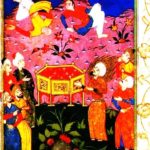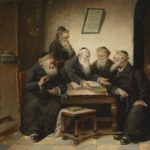In this article, I will build a compendium of sources that the Quran draws from. I will include both stories from the Scriptures of the Jews and Christians and from stories other folkloric, Talmudic, pseudoepigraphic, etc., false sources.
Sources that Are Not Scripture
Surah 96:2: He created man from a blood-clot:
- Source: Aristotle’s theory of embryology, explained here.
Surah 87:18-19: And the next life is better and more lasting.Indeed, this surely is in the former Scriptures, The Scriptures of Ibrahim (Abraham) and Musa (Moses).
- Source: Possibly a reference to the Apocalypse of Abraham (written AD 70-150). Abraham lived around 2000 BC.
Surah 74:17: I will burden him with a hard ascent.
- Source: Greek mythology. Understood by many Muslim scholars to be the “slippery mountain in the Hell-fire called AsSa’ud,” the source for this could only be the myth of Sisyphus.
Surah 89:6-9:
- Did you not see how your Lord dealt with ‘Aad,
- Iram of the pillars,
- The like of which was not created in (all) the lands,
- And Thamud, who clove the rocks in the wadi,
- Source: Islamic interpretation of pre-Islamic legends about two Arabian tribes. [The bit about the “pharaoh of the stakes” after this is just a novel bit of Islamic error but relates to the pharaoh at the time of Moses, so it half-counts as a source.]
The Harmonized Christian Apocalypse
This source has never been found but can be easily reconstructed from the details in the Quran that come, usually in a muddled form, from the Christian Bible. This is not even fragments of the actual Bible because of the peculiar misunderstandings that Muhammad takes from the different passages and because the order of things are rearranged from various books, especially Isaiah, Matthew, Luke, Mark, and Revelation, though there may also be contents from the non-canonical Book of Enoch, as well.
For the kinds of misunderstandings to take place that are evident in the Quran, this document would have had to have been highly condensed and possibly poetic–it may have actually been a hymn or something similar rather than a long-form narrative. The references to this source are so frequent and repetitive that I’ll just put main sections, rather than one-off lines, here. Once Muhammad latches onto an idea from this source, it is repeated ad nauseum in the Quran.
Surah 81:1-14:
- When the sun is wrapped up,
- And when the stars are poured out (of the sky),
- And when the mountains are moved away,
- And when the pregnant she-camels are abandoned,
- And when the wild beasts are gathered,
- And when the seas are aflame,
- And when the living beings are paired,
- And when the buried one is asked
- For what sin was she killed,
- And when the Scriptures are unrolled,
- And when Heaven is stripped off,
- And when the Fire is set ablaze,
- And when the Garden is brought near,
- A person will know what he has brought.
Ayat 1-2 echo Matthew 24:29. Ayah 3 jumps to Matthew 17:20 and Mark 11:23-24. Ayah 3-4 possibly also is echoing something that combined those verses with Luke 23:29-30. Ayah 6 is a misunderstanding of Luke 21:25. Ayah 7 is a misunderstanding of Matthew 24:37, and ayat 4 and 5 might also be related to that. This became a central “sign” to Muhammad, and from it came the doctrine that all creatures are made in “even” pairs and Allah alone is “odd.”
Ayah 10 is linked to the breaking of the seventh seal on the scroll in Revelation 8. Ayah 11 is the New Heaven of Revelation 21:1 and Isaiah 65:17. The “Garden brought near” is probably a misunderstanding of Matthew 16:27, “the Son of Man coming in his Kingdom.”
Surah 89:
- Nay! When the earth is leveled out, grinding (upon) grinding,
- And your Lord comes, and the Angels, rank (upon) rank,
- And Gehenna is brought (near) that Day, that Day man will remember, and how shall the reminder be for him?
- He will say, “O! I wish I had sent forth for my life!”
- So on that Day, none shall punish as he punishes,
- And none shall bind as he binds.
Ayah 21 comes from a misunderstanding of Isaiah 40:3-5. In ayah 22, Muhammad is thinking that it’s Allah as coming in a bodily form here (after all, he did just have a throne vision!)–Islamic theology will later change so this is Jesus, but this ayah was forgotten and not altered. At any rate, this is from Matthew 25:31 and 16:27, Mark 8:38, and Luke 9:26.
The “binding” of ayah 25-26 is from 2 Peter 2:4, Jude 1:6, and the non-canonical Enoch 10. Muhammad doesn’t know it’s the creatures commonly referred to as “fallen angels” who are bound, and he thinks for entirety of his life that it is unbelievers being bound.
Ayah 23 is obtuse. It may be that because Muhammad misunderstood the presentation of Jesus coming in his Kingdom with the physical movement of Heaven that he thought that Hell would also physically move, or it may be some other artifact in the Harmonized Christian Apocalypse that can’t be reconstructed.
Sources that Haven’t Been Located
Surah 74:26-31:
- I will burn him in Saqar!
- And what will make you know what Saqar is?
- It does not spare, and it does not leave (alone),
- Scorching the human.
- Over it are nineteen.
- And we have not made (anyone) companions of the Fire except Angels. And we have not made their number except as a trial [or affliction] for those who disbelieve–that those who were given the Book may be made certain and those who believe may increase in faith, and that those who were given the Book and the believers may not doubt, and that those (with) disease in their hearts and the disbelievers may say, “What does Allah intend by this example?” Thus Allah leads stray whom he wills, and he guides whom he wills. And none knows the hosts of your Lord except him. And it is naught but a reminder to human beings.
Allah is absolutely convinced here that there are nineteen angels (this is very clear from the context), the number of which is supposed to be a trial. People of the Book–that is, Jews and Christians–should know that Muhammad has access to sacred knowledge because nineteen angels are supposed to mean something to them. Similarly, Saqar is supposed to mean something to People of the Book. But neither nineteen angels nor Saqar mean anything to either Jews or Christians. Misreadings of this have caused Muslims to be sure that there are “miracles of nineteen” embedded into the Quran, which they try to prove ahistorically with the 1924 Cairo edition of the Hafs version of the Quran, which introduced verse numbering. Whatever the tale of nineteen angels and Saqar is, it’s unknown now. It is possible that the “nineteen” is an error and the real word should have been “gates,” however, with different vowel markings, so it may just be “Saqar” that we need to locate, which is still as obscure as always. My guess is that this source is actually some kind of misunderstood artifact of the Christian Harmonized Apocalypse because of how absolutely certain that Muhammad is that Jews and Christians should recognize this.






